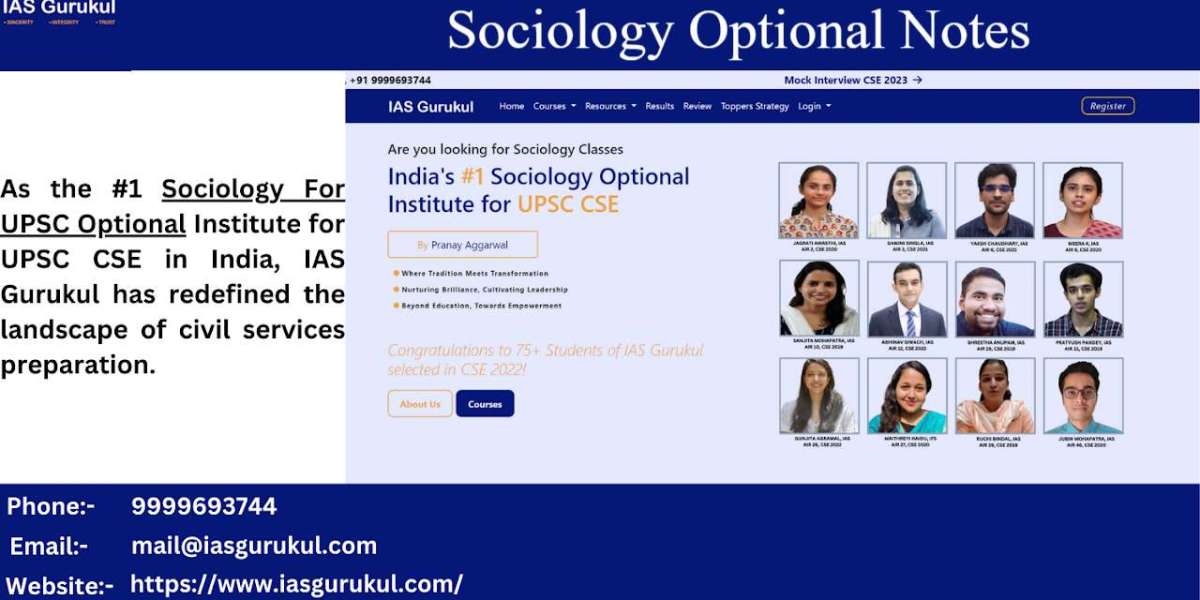The UPSC Civil Services Examination (CSE) presents candidates with a diverse range of optional subjects to choose from. Sociology stands as a powerful choice, offering not only in-depth knowledge of social dynamics but also a valuable edge for tackling your overall exam preparation.
Why Sociology is a Strategic Choice
Decoding Indian Society: Sociology equips you with the analytical tools to critically examine the complexities and nuances of India's social structures. From caste dynamics and evolving family systems to social movements and ongoing change processes, you'll develop a deep sociological understanding of the nation.
Elevating Your General Studies Answers: The General Studies papers delve heavily into social inequality, power structures, political processes, and social transformations – all core territories within Sociology. Your grounding in sociological concepts will translate into more insightful and well-rounded answers for the GS sections.
Cultivating Essential Skills: Studying Sociology hones your analytical thinking, your capacity to evaluate evidence, and your ability to construct clear, logical arguments. These are invaluable skills that directly enhance your performance throughout the UPSC exam journey.
Follow Your Intellectual Curiosity: If questions about how societies work, why some people have more than others, and how change happens pique your interest, Sociology will provide a fascinating and rewarding subject to dive into.
Navigating the Sociology Syllabus
The Sociology optional component in the UPSC CSE consists of two papers. Here's an overview of the key themes you'll encounter:
Paper – I
- The Foundations of Sociology: Explore the breadth of Sociology as a discipline, its relationship with other social sciences like economics and political science, and the ongoing debate surrounding whether it can be considered a truly objective 'science'.
- Research Methods: Your Toolkit: Understand the strengths and applications of qualitative (interviews, case studies, observation) and quantitative (surveys, statistical analysis) research methods. Learn about ethical principles for responsible sociological study.
- The Sociological Giants: Delve into the groundbreaking, often controversial, ideas of Karl Marx (class conflict, capitalism, historical materialism), Emile Durkheim (social facts, suicide, the division of labor), and Max Weber (bureaucracy, rationality, social action), whose theories continue to influence sociological thinking globally.
- Stratification and Mobility: Explore the concepts of social inequality, power imbalances, and status. Learn different theories explaining social hierarchies and how individuals may move up, down, or remain within the social structure.
Paper – II
- India Under the Sociological Lens: Turn your focus specifically to Indian society. Analyze the dynamics of the caste system, changes in family and kin structures, the challenges and aspirations of tribal communities, and the forces reshaping India, such as Sanskritization and Modernization.
- The Power of Collective Action: Examine different types of social movements, from those seeking reforms to revolutionary ones fighting for workers' rights, gender equality, environmental protection, and other pressing causes. Understand their strategies and impact on shifting policy, public debate, and power relations.
- The Marriage of Politics and Society: Study the nature of the Indian state, its democratic principles, the rights and responsibilities of citizens, and the interplay between political parties, elections, pressure groups, and broader societal dynamics.
- Society as a System: Explore contrasting perspectives on how societies function as a whole. Structural-functionalism emphasizes stability, institutions, and social order, while conflict theories focus on competition, power imbalances, and the drivers of social change.
Strategies for Conquering Sociology
- Strong Foundation First: Focus on mastering the core Paper-I concepts and thinkers. These building blocks will underpin your ability to apply them to Indian society in Paper-II.
- Spotlight on India: Continuously frame your sociological knowledge within the Indian context. Ground your arguments with relevant contemporary and historical examples.
- Topic-Wise Revision Break the syllabus into smaller, focused sections. Use topic-wise questions to test your knowledge and pinpoint areas needing more attention.
- Past Papers: Your Roadmap: Analyze previous UPSC question papers to identify trends in how questions are asked for different topics. This helps you anticipate the style and focus of potential questions.
- Practice Makes Perfect: Write answers regularly. This is the single best way to hone your ability to present information clearly and coherently.
- Seek Constructive Feedback: Share your answers with mentors, teachers, or a dedicated study circle to gain insights on how to improve.
Extra Tips for Excellence
- Connect the Dots: Sociology Optional UPSC is fundamentally about the interconnectedness of concepts. Show your understanding of how caste, class, religion, gender, politics, and economics intersect and shape each other.
- Stay Current: Ground your answers in contemporary events to illustrate your grasp of theory in action.
- Discover Your Voice: While objectivity is essential, develop a clear and distinct writing style that showcases your unique perspective informed by sociological insights.
Resources to Power Your Journey
- Reputable Textbooks: Begin with trusted Sociology textbooks recommended by successful candidates or experts.
- UPSC Website: Access past exam papers on the UPSC website (https://www.upsc.gov.in/)
- Coaching Institutes: Choose those with proven track records in guiding students towards success with the Sociology optional.
- Online Forums: Connect with fellow aspirants for support, sharing notes, and discussions.
The Decision is Yours
If you want to truly understand the complexities of society and how social change occurs, Sociology could be the perfect optional subject for your UPSC journey. With a strategic approach and consistent dedication, you will not only perform well in this optional but also see the benefits reverberate across your wider UPSC preparation.NIOS Books Preparation of Sociology Optional Sociology Optional Classes Sociology Optional Best Teacher Sociology Optional Notes Sociology UPSC UPSC Sociology Question Paper Sociology For UPSC Optional Sociology Optional UPSC Sociology UPSC Question Paper Sociology NCERT For UPSC Best Online Coaching For Sociology Optional Sociology Handwritten Notes For UPSC Sociology Optional Course UPSC Sociology Classes Best Coaching For Sociology Optional Sociology As Optional Sociology Foundation Course For UPSC Sociology UPSC Current Affairs Sociology Optional Topic Wise Questions Sociology For UPSC Notes







